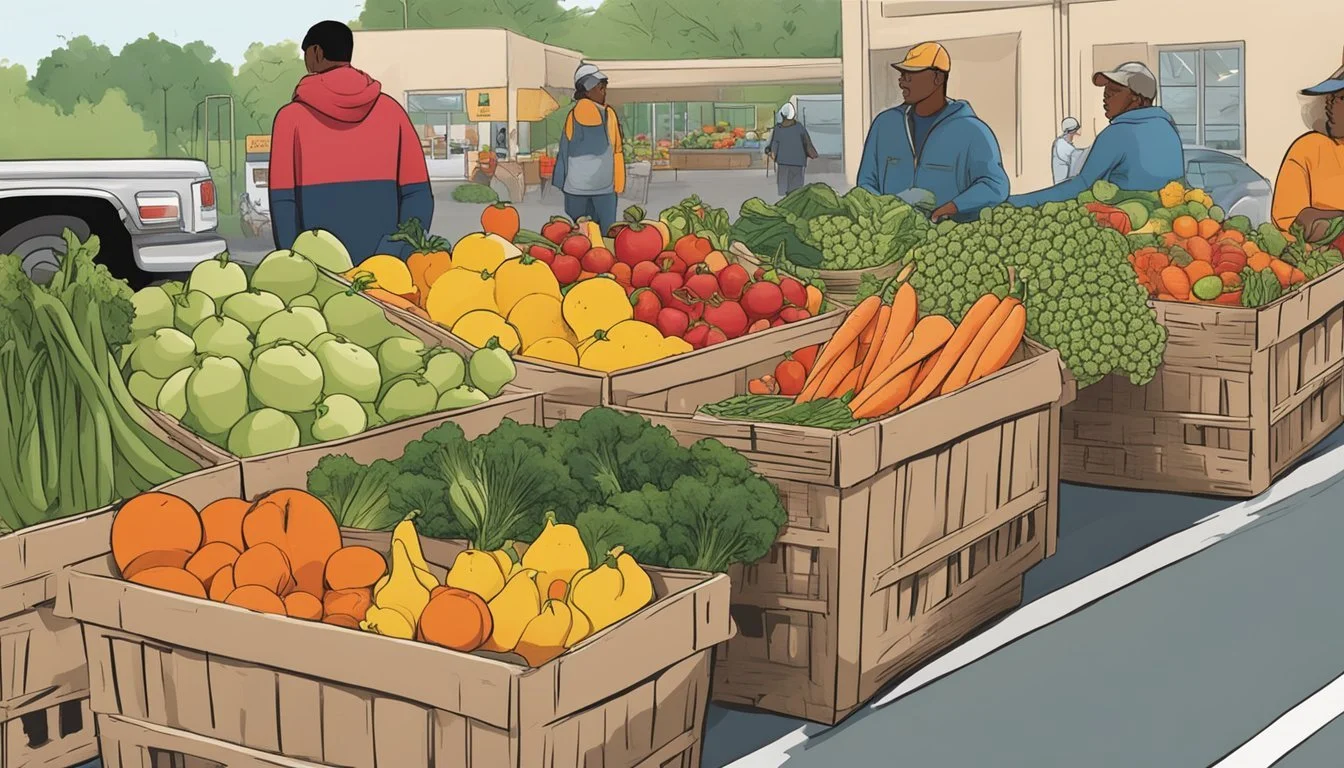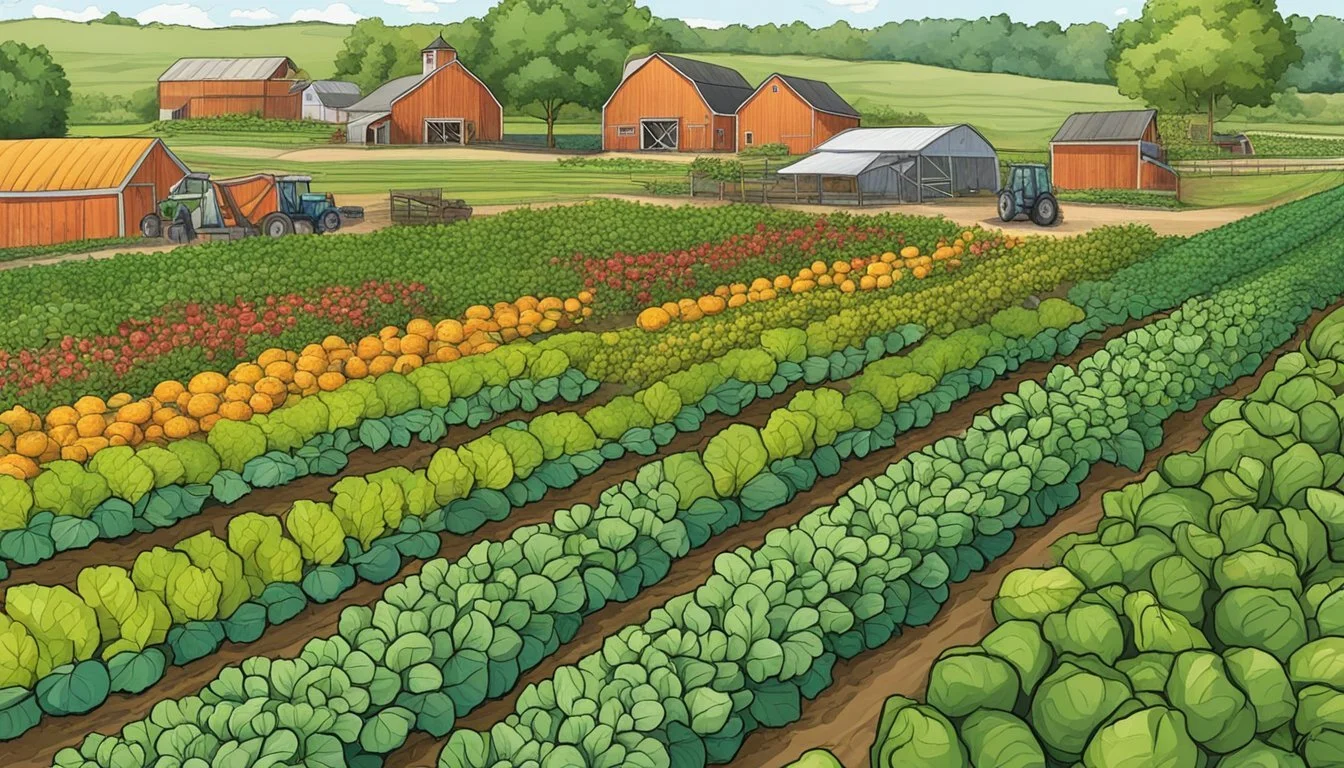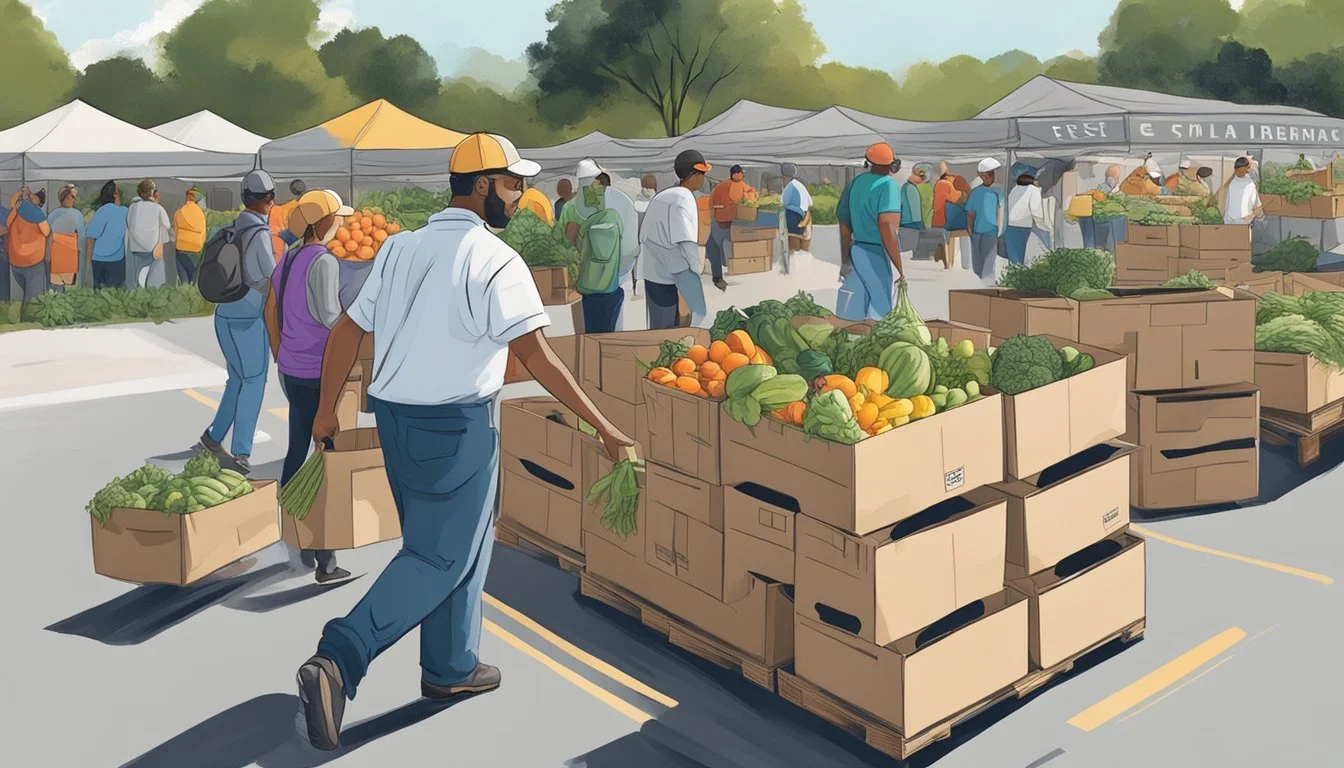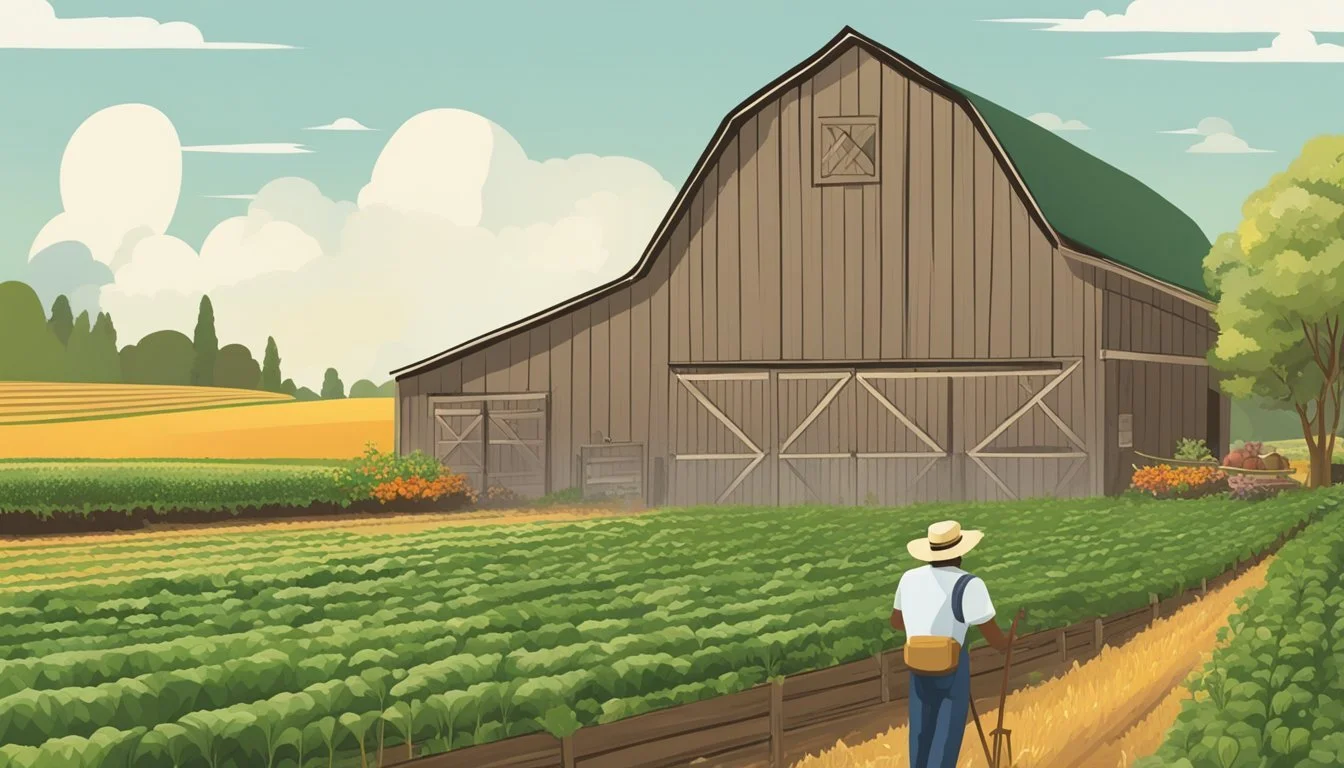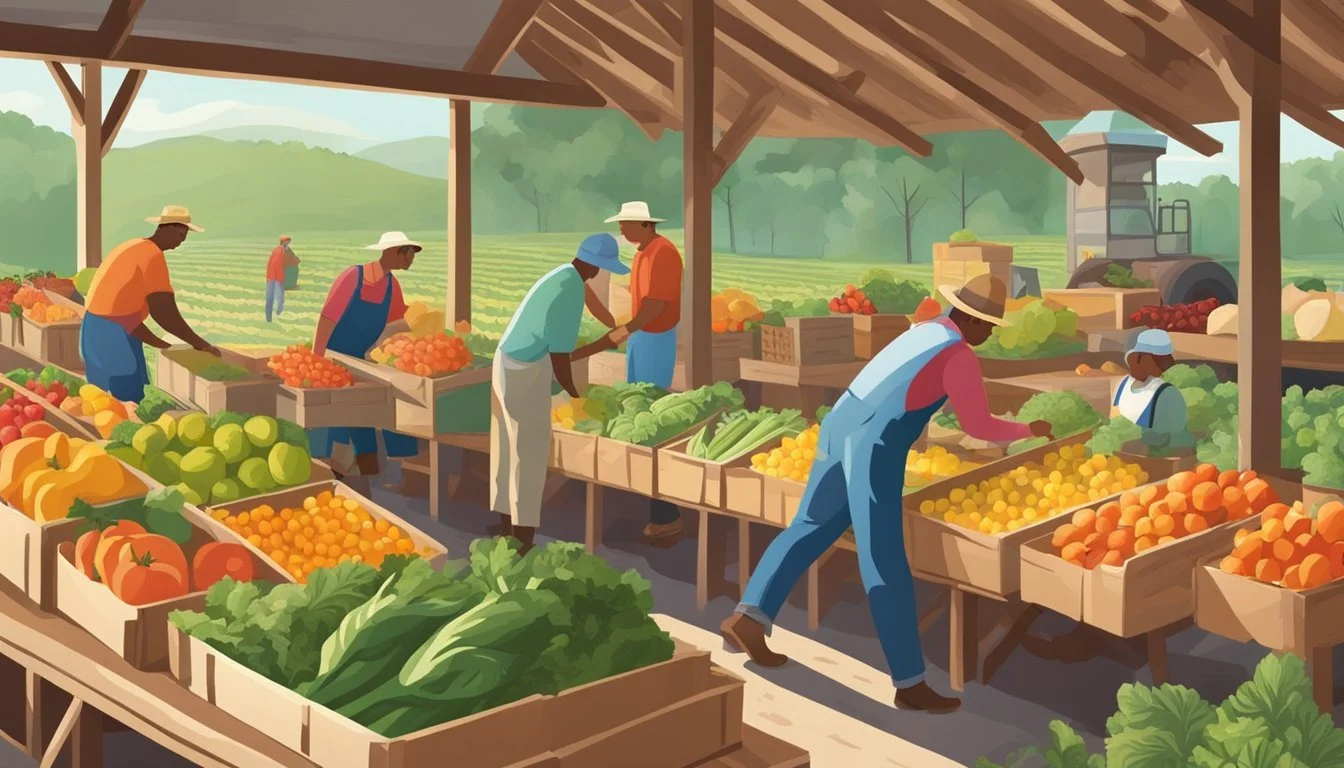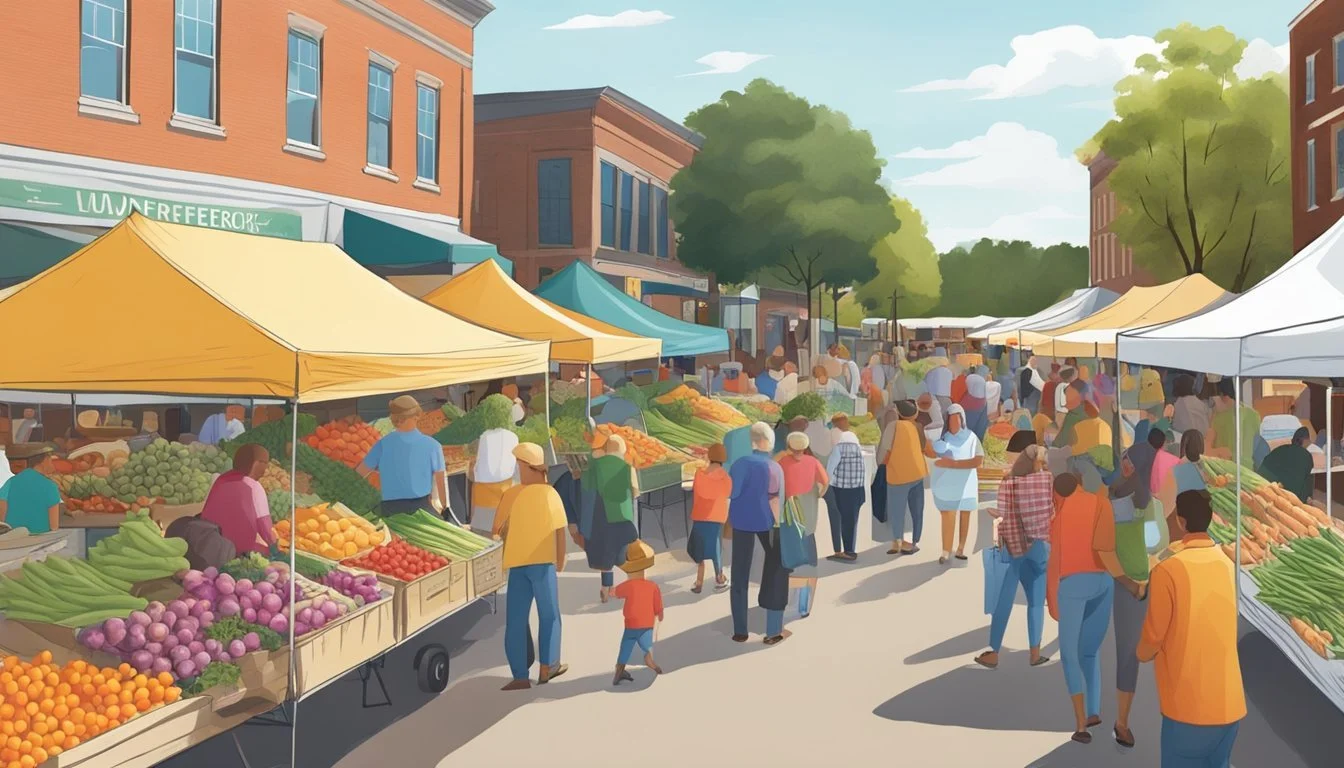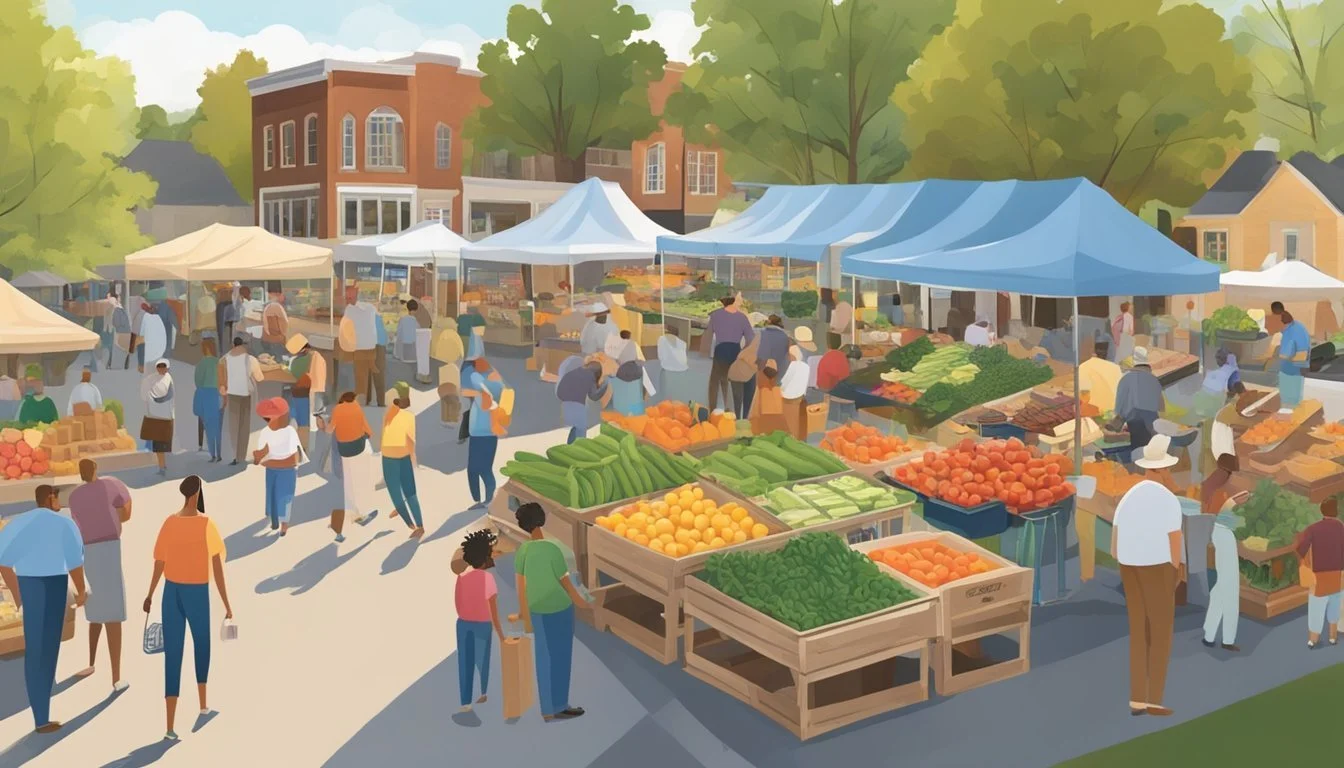Community Supported Agriculture (CSA) in Murfreesboro, TN
A Guide to Local Produce and Farms
Community Supported Agriculture, or CSA, constitutes a model of food production and distribution that directly connects farmers and consumers in the Murfreesboro, TN area. Under this system, consumers purchase shares of a farm's harvest in advance, providing the financial support needed for the production season. In return, they receive regular distributions of the farm's output, typically consisting of a variety of fresh produce.
The CSA model in Murfreesboro offers mutual benefits for both farmers and consumers. Farmers gain upfront capital to cover anticipated costs, which can mitigate the financial risks associated with farming. Consumers enjoy access to fresh, locally grown products, and often find that participating in a CSA fosters a greater understanding of seasonal agriculture. The direct connection between producer and consumer also builds community and can encourage more sustainable farming practices.
Murfreesboro's embrace of the CSA model points to a growing interest in sustainable food systems and community-based agriculture. Local farms offer various subscription options, which may range from weekly to bi-weekly and even monthly shares, designed to accommodate the diverse needs of the community. This flexible approach allows residents to choose a level of participation that fits their lifestyle, supporting the local economy while promoting healthier eating habits through a steady supply of fresh, local produce.
Understanding CSA
Community Supported Agriculture (CSA) in Murfreesboro, TN, embodies a symbiotic relationship where consumers support local farmers directly, and in exchange, they receive a share of fresh, seasonal produce throughout a specified harvest period.
Core Concepts
CSA operates on a subscription model where consumers buy shares in a farm's upcoming harvest. These shares are typically paid for in advance, ensuring farmers have a secured payment that aids in budgeting and planning. At its heart, the CSA philosophy embraces community engagement, consumer participation, and sustainable farming practices.
Benefits to Farmers and Consumers
Farmers gain financial stability through pre-season capital, which helps to cover initial production costs. This model also allows them to build a community base and receive better prices for their products by bypassing intermediaries. Consumers benefit by getting access to fresh, variety of produce while fostering a stronger connection to the source of their food. This exchange promotes local economies, and both parties share the risks and rewards of farming.
CSA Models
There are several models of CSA from which to choose:
Traditional Model: Consumers receive a set box of goods, reflecting the current harvest.
Market-Style Model: Shareholders have some flexibility to choose the contents of their share from the available weekly harvest.
CSA Add-Ons: In addition to vegetables, some CSAs offer products such as meat, eggs, dairy, bread, and flowers.
The CSA model in Murfreesboro has adapted to offer various terms, such as full-season, bi-weekly, or monthly shares, catering to different consumer needs and preferences.
CSAs in Murfreesboro
Community Supported Agriculture (CSA) in Murfreesboro, TN, reflects a growing movement where community members invest in local farms, receiving fresh produce and supporting the agricultural economy. This practice fosters a closer consumer-farmer relationship and contributes to the sustainability of local farming.
History and Growth in the Region
The concept of CSA has firmly taken root in Murfreesboro, with a noticeable boost in engagement over recent years. Initially, the focus was on small-scale operations, but interest in fresher, locally-sourced foods has catalyzed the expansion of these programs. Residents appreciate the dual benefit of receiving seasonal produce directly from the farm while also contributing to local farmer's financial stability. The city's engagement reflects the wider Middle Tennessee's embracement of community-based agriculture practices.
Popular CSA Farms
There are several notable CSA farms serving the Murfreesboro area, each with its own unique offerings and membership structures.
Wild and Sunny Farms
Offering: CSA summer share for 15 weeks starting in June.
Pick-up: Options for bi-weekly and monthly shares.
Delvin Farms
Location: College Grove, a nearby community.
Offering: Variety of organic vegetables, fruits, and other farm-produced goods.
Accessibility: Known for its presence at local farmer's markets, including those in Murfreesboro.
Bloomsbury Farm
Offering: An assortment of organic produce, with pick-up points that accommodate residents of Murfreesboro and Smyrna.
Features: In addition to CSA shares, this farm promotes events and community involvement.
CSA programs in Murfreesboro provide a direct line of support from the community to local farmers, fostering an environment where sustainable agriculture can thrive and where members have a tangible connection to the source of their food.
How CSAs Work
In Murfreesboro, TN, Community Supported Agriculture (CSA) provides a structured way for consumers to buy seasonal produce, meats, and other farm products directly from local farmers. Through a pre-arranged financial agreement, members receive fresh, locally-sourced items regularly throughout the farming season.
The Membership Process
Prospective members typically sign up for a CSA at the beginning of the growing season, often through the farm's website or at local markets. Membership requires purchasing a subscription or share—a fee paid upfront that funds the farm's operations. This direct consumer investment helps cover the production costs and secures the member's claim to a portion of the season's harvest.
What a Share Includes
A standard share in a CSA program may contain a variety of produce such as vegetables and fruits. Some CSAs in Murfreesboro may also offer add-ons like meat, eggs, and cheese. The contents of a share vary weekly and are based on what is in season, ensuring members receive the freshest products available.
Delivery and Pick Up Options
There are several ways members can receive their CSA shares in Murfreesboro. Pickup options often include on-farm collection or designated locations such as farmers' markets. Some farms may provide home delivery services for an additional fee, enhancing convenience for the members. Regularity of distribution can be weekly, bi-weekly, or monthly, depending on the CSA's structure and member preference.
Sustainable Farming Practices
In Murfreesboro, TN, Community Supported Agriculture (CSA) programs put a strong emphasis on sustainable farming methods. These practices are not only beneficial for the environment but also ensure the provision of fresh, healthy produce to the community.
Organic and Biodynamic Agriculture
CSA farms in Murfreesboro often engage in organic agriculture, avoiding the use of synthetic pesticides and fertilizers to maintain soil health and biodiversity. Certified organic farms must adhere to strict guidelines set by certifying bodies, assuring consumers of their commitment to organic practices. Additionally, some CSAs implement biodynamic farming methods. This goes beyond organic agriculture by treating the farm as a closed, self-sustaining ecosystem. Biodynamic farms often use specially prepared composts and herbal sprays and align their planting schedules with lunar cycles.
Organic Practices:
No synthetic pesticides or fertilizers
Soil health as a priority
Biodiversity enhancement
Biodynamic Practices:
Closed, self-sustaining ecosystems
Use of biodynamic composts and sprays
Planting aligned with lunar cycles
Environmental Impact
The environmental impact of farming is a critical concern for CSAs in Murfreesboro. By integrating sustainable techniques into daily operations, they significantly reduce carbon footprints. Practices such as providing grass-fed beef and free-range poultry support animal wellbeing and ecological balance. Sustainable farming methods lead to less soil erosion, better water retention, and favor an overall healthier ecosystem. CSA programs illustrating this commitment to the environment can play a pivotal role in educating consumers about the importance of sustainability in agriculture.
Sustainable Techniques:
Reduced carbon footprint
Lower soil erosion
Enhanced water retention
Animal Welfare:
Grass-fed beef
Free-range poultry
Through organic and biodynamic agriculture, CSA farms in Murfreesboro strive to minimize their environmental impact while promoting healthy food choices and a vibrant local food economy.
Seasonal Eating
Engaging with a Community Supported Agriculture (CSA) program in Murfreesboro, TN empowers residents to partake in seasonal eating, experiencing the freshest produce each season has to offer. Seasonal eating reflects the cycles of nature in agriculture, bringing a variety of flavors and nutritional profiles to the table throughout the year.
What to Expect in Various Seasons
Spring: As the growing season begins, one can expect a harvest of tender, leafy greens such as spinach, kale, and lettuces. Root vegetables like radishes and turnips may also make an early appearance.
Spring Harvest:
Spinach
Kale
Lettuces
Radishes
Turnips
Summer: Summer yields an abundance of variety. Fresh tomatoes, cucumbers, peppers, and squash are commonly found in CSA shares during this warm season. Fruits like berries start to come in, and the longer daylight hours support a more extensive range of crops.
Summer Harvest:
Tomatoes
Cucumbers
Peppers
Squash
Berries
Participating in a CSA during these seasons connects consumers to the rhythm of the local growing season, ensuring that they receive the most flavorful and nutrient-dense produce available.
Connecting With Local Farms
Murfreesboro, TN has a thriving network of local farms that foster a strong bond between producers and consumers through Community Supported Agriculture. These farms provide an avenue for residents to access fresh, local food while participating directly in the support and growth of the agricultural community.
Benefits of Local Food
Local food is revered not only for its freshness but also for the minimal transportation required to bring products from farm to table. Wild and Sunny Farms, for example, operates within Murfreesboro itself, offering CSA shares that enable members to enjoy seasonal harvests right from their urban farm. Foods grown locally are typically harvested at peak ripeness, which can lead to better nutrition and flavor.
Advantages of local food include:
Freshness: Reduced time between harvest and consumption maintains nutritional value and taste.
Environmental Impact: Lower transportation requirements reduce the carbon footprint.
Economic Support: Buying local keeps money within the community, bolstering the local economy.
Building Farmer-Consumer Relationships
CSAs in Murfreesboro bridge the gap between residents and farmers, creating a mutually beneficial relationship. Organizations like LocalHarvest and PickTnProducts.org provide platforms where individuals can locate and connect with nearby CSA programs.
Elements of farmer-consumer relationships:
Transparency: Consumers gain insights into food production and farming practices.
Support: Consumers actively participate in the financial stability of the farms they invest in.
Community: Relationships built over time contribute to a strengthened sense of community.
Partaking in a CSA not only ensures that individuals receive fresh, locally-sourced produce but also cultivates a sense of investment and partnership between consumers and farmers, thereby reinforcing the local farmers market network. Through this system, patrons of Murfreesboro's farms are not just consumers, but active stakeholders in the local agricultural economy.
Preparing and Using CSA Produce
When someone in Murfreesboro, TN, subscribes to a Community Supported Agriculture (CSA) program, they receive a bounty of fresh produce each week. The challenge is to use this fresh fruit and vegetables inventively and to reduce waste through proper storage and timely cooking.
Cooking Tips and Recipes
Storage: To extend the freshness of CSA produce, they should store leafy greens in damp paper towels and keep them refrigerated. Root vegetables are best stored in a cool, dark place, often separated by vegetable type to prevent early spoilage.
Washing and Prepping:
Leafy Greens: Rinse well in cold water before storage or use.
Root Vegetables: Scrub gently to remove dirt. Peeling is optional depending on the recipe.
Fruit: Rinse under cold water just before usage to prevent hastening decay.
Herbs: Store them with stems in a glass of water, like a bouquet, or wrap them in a damp paper towel and place them inside a sealed bag in the refrigerator.
Cooking:
Utilizing CSA produce in cooking requires flexibility because the variety of produce received can vary from week to week. Below are general tips and ideas for cooking with CSA produce:
Salads: Mix any combination of greens, sliced vegetables, and fruit to create fresh salads. Add nuts or seeds for crunch and protein.
Stir-Fry: Quickly cook an assortment of vegetables such as bell peppers, onions, and snap peas in a hot pan with a little oil for an easy meal.
Roasting: Root vegetables like carrots, beets, and potatoes can be chopped, tossed with oil and spices, and roasted for a flavorful side dish.
Smoothies: Blend leafy greens with a mix of fruit for a nutritious drink.
Recipes:
Zucchini Ribbon Pasta:
Use a vegetable peeler to create long strips of fresh zucchini.
Saute in garlic and olive oil, and toss with cooked pasta, lemon zest, and parmesan.
Stuffed Bell Peppers (What wine goes well with stuffed bell peppers?):
Halve and seed bell peppers.
Fill with a mixture of cooked rice, sautéed onion, tomatoes, and spices.
Bake until tender.
Berry Crisp:
Toss fresh berries with a bit of sugar and lemon juice, place in a baking dish.
Top with an oat and almond mixture and bake until bubbly.
These tips and simple recipes aim to inspire creative uses of CSA produce and make the most out of the weekly delivery from local Murfreesboro farms.
Joining a CSA
Community Supported Agriculture (CSA) programs in Murfreesboro, TN provide residents with the opportunity to source fresh, locally produced food while supporting local farmers. Prospective members should consider specific questions before joining, and understand the costs and commitments involved.
Questions to Consider Before Joining
One should ask these important questions:
Which farms offer CSA programs in Murfreesboro? LocalHarvest lists farms such as Wild and Sunny Farms that might suit one's needs.
What variety of produce and farm goods are included? While most shares typically consist of vegetables, some may offer meat, eggs, or dairy.
How long does the CSA season last? For example, Wild and Sunny Farms offers a 15-week summer share program.
What are the pick-up locations and times? Some programs in Murfreesboro offer multiple pick-up points and may vary in frequency.
Cost and Commitment
Membership Fee: Farms may require an initial fee to join a CSA. Edible Nashville mentions a standard fee of $50.
Share Price: Payment for the share, which includes the weekly produce, varies by farm.
Payment Schedule: Determine if it is a one-time payment or if installment options are available.
Commitment Level: One must consider the duration and the frequency of the CSA. Some offer bi-weekly or monthly shares.
Additional CSA Resources
Community Supported Agriculture in Murfreesboro serves as a platform for education and community engagement. Through various resources, members can deepen their understanding of sustainable agriculture and participate in local food initiatives.
Educational and Community Resources
Local farms and organizations in Murfreesboro offer a wealth of educational resources to CSA members and the community at large. These resources include:
On-Farm Learning: Farms offering CSA shares also provide opportunities for community members to learn about farming practices directly on the farm.
Partnerships with Schools: Some CSAs partner with local schools to incorporate agricultural education into their curriculums.
Events and Workshops
CSAs frequently host events and workshops that are pivotal for both education and community building:
Seasonal Workshops: These workshops cover a variety of topics, from organic farming methods to cooking demonstrations with seasonal produce.
Community Events: CSA programs in Murfreesboro may organize events such as farm-to-table dinners and harvest festivals, which promote local agriculture and strengthen community ties.
CSA Alternatives
In Murfreesboro, there are diverse offerings beyond traditional CSAs that allow residents to access local organic produce. These alternatives include market-style pickups and participation in local farmers markets.
Other Sources for Local Organic Produce
Market-Style Pickups: These are setups where consumers can choose their produce directly, akin to shopping at a market. Instead of receiving a predetermined share, customers have the flexibility to select the fruits and vegetables that best fit their needs, often at a designated pickup location.
Farmers Markets: Murfreesboro hosts farmers markets that serve as an excellent alternative to CSAs. They typically offer a wide variety of local, organic produce from multiple vendors. This format not only enables consumers to purchase fresh, seasonal goods but also supports the local farming community directly.
Supporting Local Agriculture Beyond CSA
In Murfreesboro, TN, fostering robust local agriculture extends beyond participating in Community Supported Agriculture programs. Residents can play a crucial role in the sustainable food economy through active volunteering and community engagement, as well as by joining forces with advocacy and support groups focused on promoting local agriculture.
Volunteering and Community Engagement
Volunteering offers tangible support to local farms and agricultural initiatives. Residents of Murfreesboro can directly engage by donating their time and labor. Opportunities include:
Farm Work: Assisting with planting, weeding, harvesting, and packing at local farms.
Educational Programs: Supporting agricultural education by volunteering at school gardens or local food workshops.
Through these efforts, volunteers help reduce labor costs for farmers and contribute to the proliferation of agricultural knowledge within the community.
Advocacy and Support Groups
Advocacy plays a vital role in sustaining and growing local agriculture outside of CSA memberships. Murfreesboro community members can:
Form Support Groups: Establish coalitions that offer resources and support to small farms and local agri-businesses.
Policy Engagement: Advocate for local policies that benefit sustainable farming practices and protect agricultural land.
By joining support groups and engaging in policy advocacy, individuals contribute to shaping an environment where local agriculture can thrive, ensuring the longevity and success of local food systems.


